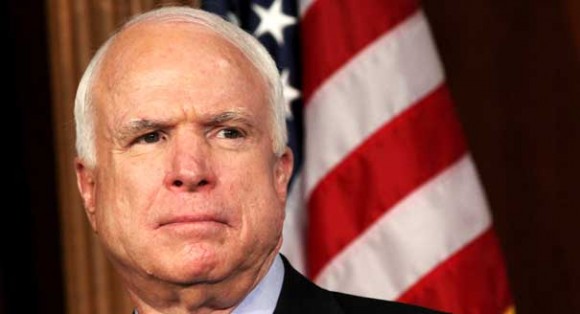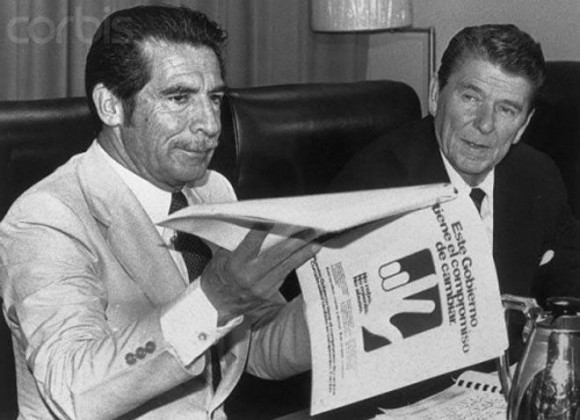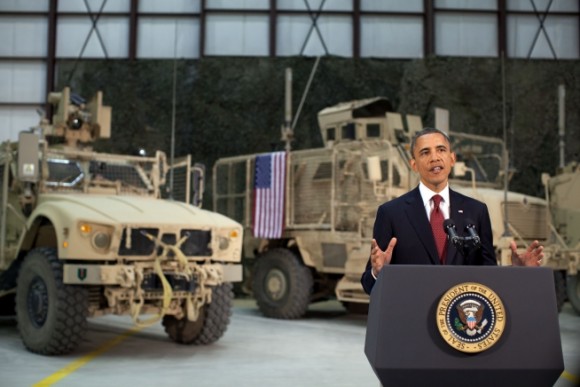
Advocates of U.S. military action in Syria have grown fond of responding to opponents of intervention with what they seem to think is a ‘gotcha.’ Opponents of intervention keep warning of the potential catastrophe of getting involved in another Middle Eastern conflict that could draw us in to another lengthy quagmire like Iraq and Syria. Advocates cleverly retort: “But we don’t want boots on the ground!!”
A fine example of this was reported today at The Daily Beast by Josh Rogin. Apparently, John McCain – perhaps the most prominent and vocal advocate of “limited intervention” in Syria, actually went inside Syria just recently in an unannounced visit to the rebel leader Gen. Salem Idris. A coordinated act of propaganda no doubt, the rebels told McCain that what they want is the U.S. to arm the rebels, impose a no-fly zone, and bomb the Assad regime and Hezbollah.
Julien Barnes-Dacey and Daniel Levy have written a policy brief for the European Council on Foreign Relations that reviews the so-called “limited” options of directly arming the Syrian rebels and imposing no-fly zones. It it well worth a read. Here are some sample excerpts:
No-Fly Zones
- …it is unclear how much killing would be prevented. According to General Martin Dempsey, chairman of the US joint chiefs of staff, only 10 percent of opposition casualties result from air strikes. Moreover, safe zones could cement the collapse of the central state, and, given existing intra-rebel fighting, competing groups are likely to seek local control through violent means. As demonstrated by developments in some opposition-held areas in parts of northern Syria, this could render them anything but safe for the civilian population. As noted by António Guterres, the UN high commissioner for refugees: “Bitter experience has shown that it is rarely possible to provide effective protection and security in such areas.”
- Syria’s collapse accelerated by the establishment of safe zones would also pose a danger to the territorial unity of neighbouring states, fuelling, for instance, existing tendencies towards militia-run zones in Lebanon and Iraq, and thereby potentially feeding a series of regional civil wars. Additionally, the act of establishing safe zones would be an act of war against Syria, with the obvious dangers of escalation and mission creep.
Arming the Opposition
- First, it is unrealistic to expect that weapons can be guaranteed to end up in the hands of pro-Western actors. The US and its allies were unable to achieve the micro-management of weapons control in Iraq and Afghanistan, even with a massive physical presence there, so it is unlikely that they will fare better doing this with a light footprint. The apparent Western conduit, the Supreme Military Council under General Salim Idris, has a limited remit over battlefield groups. This will be particularly challenging given that Jubhat al-Nusra – an organisation with declared ideological links to al-Qaeda – is now considered the strongest and most effective rebel fighting force.
- …There is a real danger that these weapons could find their way into sectarian tensions in neighbouring countries such as Lebanon and Iraq, supplying oxygen for the outbreak of an arc of sectarian conflict across the Levant. The other neighbouring countries – Jordan, Turkey, and Israel – are all also feeling the ripple effects in different ways.
- …Moreover, increased foreign support to predominantly Sunni rebels feeds Assad’s longstanding claim that Syria faces a foreign-backed Islamist plot, enabling him to further mobilize his domestic and international support base. Pro-opposition escalation is therefore likely to be met with escalation by the regime.
- Rebels currently unwilling to engage in negotiations with the regime (distinct from accepting the regime’s political surrender, which they are prepared to do) are even less likely to do so once they receive Western armed support.
Earlier this month, Secretary of State John Kerry, with his Russian counterpart Sergey Lavrov, announced an impending diplomatic convention at which negotiations between all sides in Syria could take place. This is an attempt to get going on some sort of political transition that would hopefully make discussions of military options obsolete. But Washington is making two major mistakes going into the negotiations, write Levy and Barnes-Dacey, that sets up the diplomatic push for ultimate doom.
First, the U.S. has stuck to its initial demand that ‘Assad must go.’But this essentially ensures continued fighting and bloody stalemate. “Insisting on Assad’s removal and a full transfer of power may represent a morally appealing position for the main trans-Atlantic protagonists but it amounts to dictating terms of surrender and is antithetical to pursuing a diplomatic track with the Syrian regime or its backers,” says their policy brief.
Second, the U.S. has rejected the inclusion of Iran in the negotiations. This type of approach reinforces the tendency toward proxy war that has been the hallmark of the international fight in Syria from the beginning. If, as demanded by the U.S., one side of negotiations has Saudi Arabia, Qatar, Turkey, the United States, and the rebel opposition, and the other side has simply Russia, it will signal to the Assad regime and its backers that the point of the negotiations is to impose regime change, to the automatic detriment of their interests. Clearly, both Iran, Russia, and Hezbollah will see aiding the Assad regime in a continuing proxy war as a better option – and thus the negotiations will collapse.





